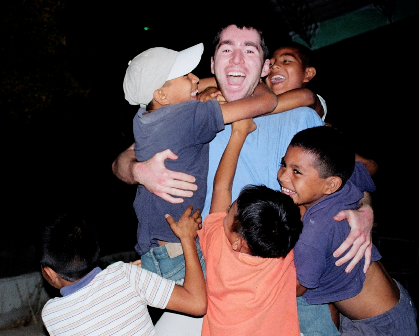Roosters, Plantains and Pharmacy: Delivering Healthcare in Honduras
Ted Doyle
Shoulder to Shoulder
Winter Medical Brigade
February 13-22, 2009
Guachipilincito, Intibucá Honduras
Not many sixth-year students can say that they have already run a pharmacy. Then again, they probably haven’t worked in one without screened windows, running water or electricity. This was a temporary pharmacy, borrowing space from a small building usually used as a school classroom or for small community gatherings. The building was made of a type of clay covered in a mixed terracotta-tin roof. Cattle migrated by and grazed just beyond the barbed-wire fence enclosing the structure. Within one day of arrival, we established our mission and unpacked supplies. We carried in tables and put up sheets to section off examination rooms. The boxes with our medicines were unpacked and the tablets were counted and portioned into small Ziploc bags. This pharmacy carried vitamins, antibiotics, corticosteroid creams, antacids, ranitidine, eye drops, antifungal preparations, salbutamol, diphenhydramine, anti-inflammatory pain relievers, and agents for treating parasites. The medicines we intended to offer were not sufficient to attenuate the symptoms and progression of chronic diseases. My initial frustrations of working with a limited formulary melted in the 89-degree heat and I made do with what we had. I resorted to pouring liquid acetaminophen into an empty bottle of children’s vitamins.The dichotomy between the breathtaking mountain scenery and the strife of the people who lived there was palpable.
It was clear that we were there to relieve the burdens of poverty. Monday morning came and we opened the clinic. Our residents and physicians sat at nearby tables and talked with patients in a way resembling a clinic visit. Everyone came to the pharmacy. The medical students and residents inquired about drug dosing and the place of medicine as the sole option available for therapy.The practice skills I gathered in Dr. MacDonnell’s class came into play as counseling was provided to every patient. We offered high standards of care and pharmacist-patient interaction was never more apparent. I spoke with a young woman on how to administer her baby’s vitamin drops. She giggled at the slightly less than perfect Spanish I spoke with a Castilian lisp. Although supplies were limited and patients were numerous, they waited, they were kind, and very grateful.
The roosters began their calls by 4 in the morning. We were all awake two hours later, still tired from the day before. I gathered water from the pila, an outdoor,



